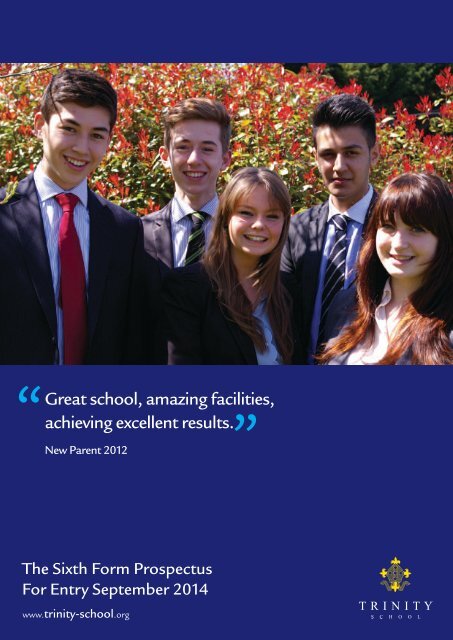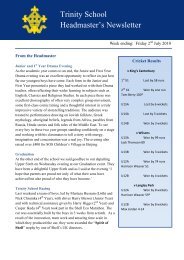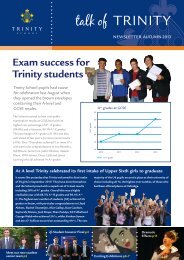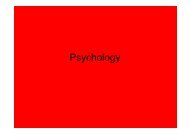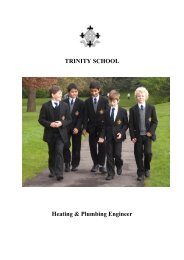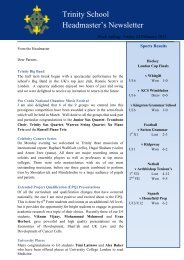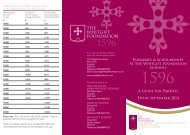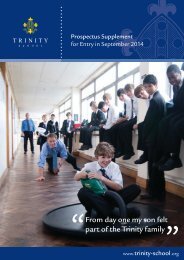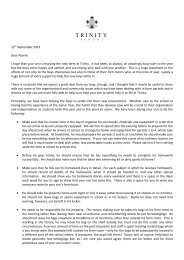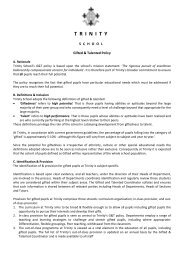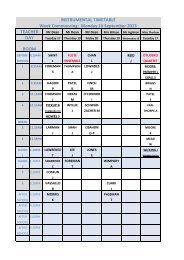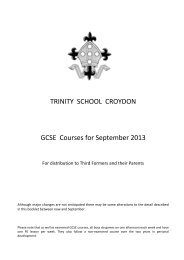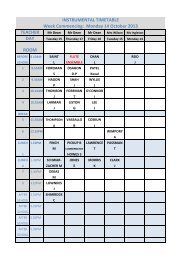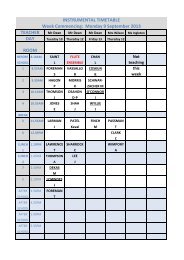Sixth Form - Trinity School
Sixth Form - Trinity School
Sixth Form - Trinity School
- No tags were found...
You also want an ePaper? Increase the reach of your titles
YUMPU automatically turns print PDFs into web optimized ePapers that Google loves.
Extra Curricular | SIXTH FORM PROSPECTUS – ENTRY 2014Learning beyond the classroom• In addition to a wide variety of sports, <strong>Sixth</strong> <strong>Form</strong>ers can getinvolved in a range of activities including music, drama and theYoung Enterprise Scheme, involving other local schools• Recent trips have included visits to Washington, New York,Vietnam, Madrid and Malta, as well as places closer to homelike Devon and CornwallDRAMA PRODUCTIONSMembers of the <strong>Sixth</strong> <strong>Form</strong> contribute theirconsiderable talents to drama productionsin a variety of ways.The <strong>School</strong> regularly stages plays andmusicals; recent productions includeGuys and Dolls, The Government Inspector byNikolai Gogol, and Little Foot, a playperformed as part of The NationalTheatre’s Connections programme.It was also performed at the Rose Theatrein Kingston. All of these featured <strong>Sixth</strong><strong>Form</strong> students in leading roles.In Autumn 2013 we are staging a large scaleproduction of Grease in the <strong>Trinity</strong> ConcertHall after the huge success of last year’smusical. There are also opportunities forstudents to direct plays. Productions arestaged in either the <strong>School</strong>’s purpose-builtMitre Theatre, in the Drama Studio or onthe newly refurbished <strong>Trinity</strong> Concert Hallstage; plays have also been on tour to otherschools and theatres. There is a weeklyDrama club which is well-attended by <strong>Sixth</strong>formers, who also help to run the club.Many of the Drama productions’ stagecrew are recruited from the <strong>Sixth</strong> form,including stage managers, lighting andsound engineers, set and costumedesigners. The crew meet weekly to preparefor productions and to help withcurriculum drama events such as theDrama & Theatre Studies A-levelperformances. The Drama departmentalso organises theatre trips for <strong>Sixth</strong> <strong>Form</strong>students.“I chose <strong>Trinity</strong> <strong>School</strong> in part because of Music and Drama and both have exceeded my expectations.“6 | <strong>Trinity</strong> <strong>School</strong> <strong>Sixth</strong> <strong>Form</strong> Prospectus | Entry September 2014
SIXTH FORM PROSPECTUS – ENTRY 2014| Extra CurricularMUSIC AT TRINITYThere is a wide variety of musical activitieson offer and <strong>Sixth</strong> <strong>Form</strong> students oftentake a leading role in instrumental groupsand choirs.For instrumentalists, the large ensemblesinclude the Symphony Orchestra, <strong>Trinity</strong>Strings, the Symphonic Wind Band andthe Big Band. There are too many smallergroups to list here, but they include stringquartets, piano trios, saxophone quartets,clarinet quintets, and brass groups. Jazzthrives and players of all levels on allinstruments are invited to the weekly jazzworkshops. Both electric and classicalguitarists are also well catered for, withweekly rehearsals in a number of groups.Pianists benefit from <strong>Trinity</strong> being an All-Steinway <strong>School</strong> since September 2012.Singing is very popular at <strong>Trinity</strong>. Inaddition to the Choristers, there is amixed Senior Chamber Choir and TheGirls’ Choir.Our visiting music teachers cover all themain orchestral instruments as well asclassical singing, jazz singing, orchestralpercussion, drum kit, all sorts of guitars,piano, and organ.“I love doing Music at <strong>Trinity</strong> because it gives me the opportunity to explore differenttalents, whether it be playing the flute at Cadogan Hall or singing in Guys and Dolls.There is such a strong sense of community in the Music Department. Everyone is verysupportive of each other no matter whether they are Grade 1 or Diploma level.“www.trinity-school.org | 7
Extra Curricular | SIXTH FORM PROSPECTUS – ENTRY 2014Make a difference, give something back and developvital leadership and interpersonal skills• Students can take on leadership roles inthe <strong>School</strong> community through clubsand societies, mentoring and thePrefect system, gaining valuableexperience and skills for later life• The <strong>Sixth</strong> <strong>Form</strong> Council is a dynamicbody run by students, for students –its decisions shape and influence the<strong>Trinity</strong> learning environment andexperience• The Community Action Programme isan introduction to the benefits ofvolunteering and students are currentlycarrying out conservation work,assisting older people with practicaltasks and IT skills and working withprimary school children, teachingsports skills and running music sessionsfor children with autism• This is just a small part of the workundertaken which gives valuable skillsto students whilst helping local people.We were honoured to receive the‘<strong>School</strong> of the Year’ Award at the 2012Croydon Civic Community Awardsceremony for the work that the L6carried out at Croydon Ecology CentreYOUNG ENTERPRISEYoung Enterprise (YE) is a well establishednational scheme, highly valued byuniversities and employers wherebystudents learn about business by runningtheir own company. Each YE businessconsists of about twenty students fromlocal state and independent schools andinvolves having to work with new groupsof people which helps develop valuablecommunication skills.Following the launch in October,students have to raise share capital,appoint directors, register their companyname and go into business. Stationery,mobile phone accessories, watches, bagsand candles are all typical products.More ambitious products have includeda cookbook App and personalised storybooks for children.Sponsor companies provide lead adviserswho assist with business matters andpremises for the meetings, which takeplace every week from 5pm to 7pmduring term time until liquidation in May.At the Area Finals, the culmination of theyear, the audience is always impressed bythe breadth of business knowledge, selfconfidenceand maturity of theparticipants. There are prizes for Achieverof the Year and Company of the Year aswell as for specific business skills.The winning company goes through tocompete at national level.As a member of the Lower <strong>Sixth</strong> you willbe invited to join the Young Enterprisescheme in September. It represents a greatopportunity to meet many other peoplefrom local schools, gain genuine businessexperience and have an enjoyable year asa Young Enterprise Achiever.“<strong>Trinity</strong> gets the balanceright between being anincredibly academicschool and all the extraopportunities available.New Parent 2012“<strong>Trinity</strong> has established a significant reputation inthe ifs Student Investor Challenge competition withour team Stochastic (pictured), being the mostsuccessful trading company for the last three years.8 | <strong>Trinity</strong> <strong>School</strong> <strong>Sixth</strong> <strong>Form</strong> Prospectus | Entry September 2014
Extra Curricular | SIXTH FORM PROSPECTUS – ENTRY 2014SPORT<strong>Trinity</strong> <strong>School</strong> has a long establishedreputation for sporting excellence.We have many pupils who have recentlygained representative honours at Countyand International level and the <strong>School</strong>enters both regional and nationalcompetitions with frequent success.There are many notable sportsmen on thestaff who have played at Senior andInternational level. Aaron Liffchak, Headof Rugby and Sports Development, is aformer rugby union professional whoplayed for Saracens and is a formerinternational junior athlete. AndrewCornick, Head of PE, is a current WelshInternational hockey player. RichardRisebro, the Master in Charge of Cricket,is a former Head Coach with the KenBarrington Cricket Centre, Surrey. MattRichbell, Director of Sport, has extensiveexperience running sports departmentsand coaching rugby, water polo andtennis. Other high quality playerscoaching at <strong>Trinity</strong> include Ian Kench(Sale, England Students Rugby), JamesInglis (England Counties Rugby), JoeNaughalty (Wales Hockey), RebeccaWallace (Regional Netball), and Claire-Jane McPherson (Scottish and BritishMasters Champion Swimmer).We are fortunate to have a large number ofknowledgeable, dedicated, enthusiasticcoaches drawn from the <strong>School</strong>’s teachingand Sports Centre staff – many of whomare distinguished sportsmen and women intheir own right. At <strong>Trinity</strong> you are bound tofind not only the sport that interests youbut also the level of support that is rightfor you. Whether your personal aim is toachieve excellence at school, local ornational level – or you simply want to playsport for enjoyment’s sake – <strong>Trinity</strong> canoffer the facilities, expertise andencouragement you need to fulfil yourpotential at both individual and team level.<strong>Trinity</strong>’s facilities are extensive andimpressive. There are six rugby pitches, twofloodlit astroturf pitches, a newlyrefurbished swimming pool, four netballcourts, ten outdoor tennis courts and ninebadminton courts. The <strong>School</strong> benefitsfrom a modern sports complexincorporating two sports halls, foursquash courts, a fully equipped fitnesssuite plus indoor and outdoor cricket nets.Major team sports for <strong>Sixth</strong> <strong>Form</strong> boysare rugby, hockey, football, and cricket.For girls, the major team sports are netballand hockey. There are a range of othersports in which students can choose toparticipate, including archery, athletics,badminton, basketball, climbing, crosscountry, fitness, table tennis, tennis,sailing, squash, sub-aqua diving,swimming, water polo and weight training.If you have specific queries, please contactMatt Richbell (Director of Sport) atmdr@trinity.croydon.sch.uk.“For the first time in many years my daughteris taking part in and enjoying sports.New Parent 2012“10 | <strong>Trinity</strong> <strong>School</strong> <strong>Sixth</strong> <strong>Form</strong> Prospectus | Entry September 2014
SIXTH FORM PROSPECTUS – ENTRY 2014| <strong>School</strong> FacilitiesOutstanding facilitiesVisitors to <strong>Trinity</strong> often comment on how much its buildings and grounds give the <strong>School</strong> the feeling of a universitycampus. In part, this comes from the incredible range and quality of facilities we can offer <strong>Sixth</strong> <strong>Form</strong> students.SCHOOL FACILITIES• New <strong>Sixth</strong> <strong>Form</strong> Centre• Sculpture studio• Ceramics workshop• Electronics workshops• The <strong>School</strong>’s own art gallery• Apple-based editing suites• Dark rooms• Large <strong>School</strong> Library• Five fully-equipped ICT suites“ can meet up with friends and just chat over a cup of coffee.I especially enjoy the <strong>Sixth</strong> <strong>Form</strong> Centre, as it is a place where I<strong>Trinity</strong>’s <strong>Sixth</strong> <strong>Form</strong> students can enjoyall the facilities and the bustle of a large,busy school whilst also having their owndedicated space. Our new <strong>Sixth</strong> <strong>Form</strong>Centre offers a light and spaciouscommon room area with its own caféand well-appointed study suites to helpstudents achieve their goals at schooland beyond.Apart from the superb sports facilitiesdescribed on the previous page, ourstudents enjoy the use of two theatres,a rehearsal studio and a fully-equippedtelevision studio. There are dozens ofrehearsal rooms for musicians, who canthen enjoy performing their work in therecording studio or in the Concert Hall -which is also used by professionalmusicians who wish to play and recordwithin its specially designed acoustics.Since September 2012 <strong>Trinity</strong> is anAll-Steinway school offering its piano“students the ability to rehearse and playon the best instruments in the world.The Art and Design Departments enjoypurpose-built facilities including asculpture studio, ceramics workshop,garages, electronics workshops and the<strong>School</strong>’s own gallery where work can beexhibited. Photographers and filmmakersamong our students benefit fromthe latest Apple-based editing suites aswell as extensive dark rooms.The <strong>School</strong> is proud to offer one of thelargest school libraries in London, withover 30,000 books in stock along withnewspapers, magazines, music and filmsavailable for borrowing. There are fivefully equipped ICT suites and a WiFinetwork, meaning <strong>Sixth</strong> <strong>Form</strong> studentscan stay connected through PCs, laptopsor their own phones.• Two theatres• Rehearsal studio• Television studio• Rehearsal rooms• Recording studio• Concert hall• All - Steinway <strong>School</strong>SPORT FACILITIES• Six rugby pitches• Two floodlit astroturf pitches• Newly refurbished swimming pool• Four netball courts• Twelve outdoor tennis courts• Eight badminton courts• Modern sports complex• Two sports halls• Three squash courts• Fully-equipped fitness suite• Indoor and outdoor cricket netswww.trinity-school.org | 11
The <strong>Sixth</strong> <strong>Form</strong> Experience | SIXTH FORM PROSPECTUS – ENTRY 2014Independent learning with support and guidanceAlmost all <strong>Trinity</strong> students go on to take a degree course. Some select a subject that they have enjoyed at A Level, whilst others optfor one not taught at school, such as Law, Architecture, Engineering, Medicine or Performance Music. <strong>Sixth</strong> <strong>Form</strong>ers will benefitfrom unique support and guidance to ensure they achieve their best and are ready for independent learning at university.• Average class size for 2012 is 9 students. Smaller, more informalclasses than at GCSE level enable issues to be discussed anddebated with greater freedom• The new <strong>Sixth</strong> <strong>Form</strong> Centre provides dedicated <strong>Sixth</strong> <strong>Form</strong> studyareas and ICT facilities, including Wifi access, along with a caféand areas to relax in during study breaks• Every <strong>Sixth</strong> <strong>Form</strong>er meets daily with his or her tutor who canmonitor his or her work and give advice and guidance. Smallertutor groups in the <strong>Sixth</strong> <strong>Form</strong> ensure strong pastoral support• <strong>Sixth</strong> <strong>Form</strong>ers have a number of study periods when they workon their own, developing self-motivated work habitsProfessional advice on university choices and careersUNIVERSITY APPLICATIONSMost students apply to university orspecialist further education courses(such as Music or Art) at the beginningof their Upper <strong>Sixth</strong> Year. There is acomprehensive range of advice availableat <strong>Trinity</strong> to help students makeappropriate choices of degree subjectand university or direct entry to workfollowing A Levels. <strong>Sixth</strong> <strong>Form</strong> tutors willboth guide students on their personalstatement and produce their UCASreference, with assistance from the Headof <strong>Sixth</strong> <strong>Form</strong> as well as Heads ofDepartment on subject-related matters.Some universities invite candidates forinterview (usually in December or afterChristmas), and each university will issuetheir offers separately. These are usuallyconditional on the student achievingspecified grades at A Level.Some students do not apply to universityuntil the autumn after they leave <strong>Trinity</strong>(perhaps because they are taking a GAPyear, or they wish to see their results beforedeciding on their course). As they will beapplying with known A-level grades, theiruniversity offers will not be conditional.<strong>Trinity</strong> will support such applications injust the same way as those made bystudents in the Upper <strong>Sixth</strong>.CAREERS AVDVICE<strong>Trinity</strong> has a dedicated Careers Departmentwith a permanent Careers Adviser and awell-stocked Careers Library. Students canaccess wide-ranging resources not only onuniversities and potential courses but alsoon apprenticeships and other opportunitiesfor school leavers. There is also up-to-dateinformation on student finance,scholarships and bursaries, studyingabroad and Gap Year opportunities.Regular themed careers evenings givestudents the opportunity to hear what it islike to work in a particular field, and to askquestions of the speakers in a relaxedatmosphere. The Careers Department canorganise careers profiling for students andwill work with them to plan any necessarywork experience.“<strong>Trinity</strong> is a really friendly school and you get alot of help applying for universities.“Above: The Careers Library containsinformation on Higher Education courses andinstitutions, Gap Year placements and careers.12 | <strong>Trinity</strong> <strong>School</strong> <strong>Sixth</strong> <strong>Form</strong> Prospectus | Entry September 2014
SIXTH FORM PROSPECTUS – ENTRY 2014| The <strong>Sixth</strong> <strong>Form</strong> ExperienceKEY DATES FOREXTERNAL APPLICANTSMonday 14th October 2013AS choices and Open Evening for newapplicants and their parents and currentpupils and parents. By appointment only.*Friday 8th November 2013Closing date for external applicationsSaturday 23th November 2013Entrance exams and interviews for externalapplicants to the <strong>Sixth</strong> <strong>Form</strong>Admission to the <strong>Sixth</strong> <strong>Form</strong>CURRENT PUPILSEXTERNAL APPLICANTSAdmission to the <strong>Sixth</strong> <strong>Form</strong> is notEvery year a number of students from otherautomatic. A Levels are much harder than schools join the <strong>Trinity</strong> <strong>Sixth</strong> <strong>Form</strong>.GCSEs and we can only permit students Applications must be made by earlywho demonstrate the necessary level of November. Prospective pupils and theirability and commitment to their studies to parents are encouraged to visit the <strong>School</strong>embark on these courses. The vast majority for the AS choices and Open Evening inof <strong>Sixth</strong> <strong>Form</strong> students will have achieved at October (by prior arrangement). There is aleast 60 points at GCSE (A* = 8, A = 7, <strong>School</strong> Open Morning in early October thatB =6, C = 5) and will have achieved A or A* applicants are welcome to attend, but thisgrades in the subjects they take in the <strong>Sixth</strong> is principally intended to address the<strong>Form</strong>.interests of 10+ and 11+ candidates andStudents who are not likely to achieve thistheir parents. Scholarships, worth up toscore should take further advice about theirhalf of the fee, are awarded to externaloptions, but students who show good workapplicants who can demonstrate especiallyhabits and satisfy the individual subjecthigh standards in academic work, music,entry requirements for their chosen coursesart or sport. Means-tested bursaries arewill be able to join the <strong>Sixth</strong> <strong>Form</strong> if theyalso available. Applicants who haveachieve at least 4 A grades and a minimumdemonstrated the necessary level of abilityof 51 points from their best nine GCSEs.and commitment to their studies will beCurrent pupils and parents are encouragedinvited to sit the entrance examination andto attend the AS choices evening in Octoberattend interviews at <strong>Trinity</strong> in lateto help make decisions about AS-levelNovember. Please note that we wouldchoices. Boys will submit their provisionalexpect external candidates to achieve atAS choices at the end of the Autumn termleast six A grades at GCSE level and thatand final decision will be made in thethere are subject specific requirements forSpring term.each AS subject.December 2013Offers made to external applicants*An individual timetable will be produced for eachpupil attending the AS choices evening, so externalapplicants must arrange this in advance by booking aplace at this event.FeesThe fee for the academic year 2013-2014 is£13,716 (£4,572 per term).“For a fully committed andenergetic girl I wouldstrongly recommend<strong>Trinity</strong>. I am delighted thatshe is already so involved inschool activities and has astrong sense of belongingto the school.New Parent 2012“www.trinity-school.org | 13
Choosing your A-Level Courses | SIXTH FORM PROSPECTUS – ENTRY 2014A-Level Courses: implications for university entranceThese notes give, in a very condensed form, guidance to theA-level course requirements and preferences for many of thesingle subjects commonly studied at university. The inclusionof an A-level subject, or combination of subjects, indicatesthat it fulfils the entrance requirements of most, but notnecessarily all, universities.There may be a few universities whose requirements are lessstringent than those shown. A-level subject requirements forscience courses are generally more specific and consequentlyscience subjects are prominent in the lists.All university courses can lead to a wide range of careeropportunities, many of them not directly related to thesubjects studied at university.“The teachers are of the best quality -they teach you more than is requiredand go out of their way to help you.“University SubjectAccountancyAgriculture, ForestryArchitectureArt and DesignBiochemistryBiological Sciences:Biology, Applied Biology, Botany,Biotechnology, Zoology, MicrobiologyBusiness Studies, Management StudiesChemistryChemical EngineeringComputer ScienceDrama and Theatre StudiesEconomicsEngineering:Aeronautical, Civil, Electrical, Electronic,Marine, Mechanical, ProductionEnglishEnvironmental ScienceFood Science, Food TechnologyFrenchA-Level Requirement or PreferenceMathematics usually requiredChemistry and Biology usually requiredMathematics usually requiredArt or Photography usually requiredChemistry, Biology or Mathematics usually required or preferredBiology and Chemistry usually required, with Mathematics alsobeing required in some instancesMathematics usually requiredChemistry required, with Maths or Physics desirableChemistry, Physics and Mathematics usually requiredMathematics required usually with another Science or Further MathsDrama/ Theatre Studies and English sometimes required or preferredMathematics usually requiredMathematics and Physics required(Some foundation courses are available for candidateswith good results in other subjects)English Literature usually requiredVarious Science combinationsChemistry required, with two other sciencesFrench required, a second foreign language usually desirable14 | <strong>Trinity</strong> <strong>School</strong> <strong>Sixth</strong> <strong>Form</strong> Prospectus | Entry September 2014
SIXTH FORM PROSPECTUS – ENTRY 2014| Choosing your A-Level Courses“So pleased we moved schools – the best decision we could have made. At last our daughter isseen as an individual – not seen her so happy at school for a long time.“University SubjectGeographyGeologyGermanGraphic DesignHistoryLawMathematicsMedicine, DentistryMaterials ScienceMetallurgyMusicPharmacy, PharmacologyPhilosophyPhysicsPhysiologyPoliticsPsychologySocial StudiesSpanishA-Level Requirement or PreferenceGeography usually required2 or 3 subjects required from Sciences, Geography and MathematicsGerman required. A second foreign language is usually desirableArt portfolio requiredHistory required or preferredAs and Bs required - no preferred subjects, but at least two should betraditional academic subjects.Mathematics required. Some universities like to see Further Mathematics and PhysicsChemistry and Biology requiredPhysics and Mathematics requiredMathematics, Physics and Chemistry usually requiredMusic usually requiredChemistry required, Biology and/or Mathematics and/or Physics usually requiredMost courses have no specific subject requirements, but at least twotraditional academic subjectsPhysics and Mathematics requiredChemistry usually required. Biology, Physics and/or Mathematics usually requiredMost courses have no specific subject requirements, but at least twoshould be traditional academic subjectsOne or two science subjects required by Science faculties;no specific requirements by Arts faculties, of which there are fewerMost courses have no specific subject requirementsSpanish usually required. A second foreign language is desirableSports Studies/Science, Physical Education Biology and PE are desirable and usually requiredStatisticsVeterinary ScienceMathematics required, Further Mathematics desirableChemistry and Biology usually requiredwww.trinity-school.org | 15
Choosing your A-Level Courses | SIXTH FORM PROSPECTUS – ENTRY 2014AS and A2 Level subjects – the selection processLOWER SIXTHMost students will study four examined AS subjects during theyear. In most subjects there will be two modules to the AScourse. They will be examined at the end of the year and providean AS grade. These grades, together with individual modulegrades, will be available to universities as they select applicantsduring the following year.The subjects we are planning to offer are shown below. Whilstevery effort will be made to meet students’ choices, it may not bepossible to provide every combination requested. Students willnormally have achieved an A or A* grade at GCSE in the subjectsor related subjects that they take at AS Level. Below are thespecific grade criteria for each AS course.AS SubjectArt1Biology2Business StudiesChemistry2Classical CivilisationDesign and TechnologyDrama and Theatre StudiesEconomicsElectronicsEnglishFrenchGeography3GermanGovernment & PoliticsHistory3LatinMathematicsFurther Mathematics4MusicReligious Studies3Photography1Physical EducationPhysics2PsychologySpanishMinimum GCSE requirementsA in an Art endorsed GCSEA in Biology or AA in Double Award ScienceNotesB in EnglishA in Chemistry or AA in Double Award Scienceand A in MathematicsB in EnglishB in Design and TechnologyA in DramaB in Mathematics and EnglishA in MathematicsB in English Language and LiteratureA in FrenchB in Geography and EnglishA in GermanB in English and HistoryB in History and EnglishA in LatinA in MathematicsA* in Mathematics plus extension workA in Music and grade 5 instrumentB in Religious Studies and EnglishA in Photography or an Art endorsed GCSEB in EnglishA in Mathematics and either A in Physics or AA in Double Award ScienceB in English and either A in Biology or AA in Double Award ScienceA in Spanish‘B in English’ means a grade B ineither English Language or Literature.1 Art and Photography may notboth be studied.2 In Double Award Science theperformance on the relevant papermay be taken into account.3 If students wish to take one ofthese subjects without havingtaken it at GCSE they must consultthe relevant Head of Department.4 Students considering FurtherMathematics will need to discusstheir options with the Head ofDepartment.UPPER SIXTHProgress to A2 will normally require at least a grade C in thesubject at AS Level. Upper <strong>Sixth</strong> <strong>Form</strong> students will take at leastthree A-level subjects and, for many, three will be sufficient.Decisions about which subjects to continue with for A Level willbe made during the Summer Term of the Lower <strong>Sixth</strong> or, wherenecessary, after the AS results are known in August. MostA-level courses will require a further two modules to be taken atthe end of the Upper <strong>Sixth</strong> year.16 | <strong>Trinity</strong> <strong>School</strong> <strong>Sixth</strong> <strong>Form</strong> Prospectus | Entry September 2014
SIXTH FORM PROSPECTUS – ENTRY 2014| Choosing your A-Level CoursesTRINITY SCHOOL SIXTH FORMGuide to AS and A2 Subjects for entry in September 2014“Coming to <strong>Trinity</strong> <strong>Sixth</strong><strong>Form</strong> was the bestdecision I ever made.“
Choosing your A-Level Courses | SIXTH FORM PROSPECTUS – ENTRY 2014Art and DesignWhy choose Art and Design?The aims of this course are to developan understanding of the nature ofvisual thinking and its appropriatelanguage, a capacity for creativethought and action as well as tocultivate skills in drawing, painting,sculpture, ceramics and other media.See also Photography A Level.GCSE REQUIREMENTSAn A grade in any Art & Design relatedsubject is required.COURSE DETAILSThe courses are a continuation andextension of GCSE courses in Art andDesign, comprising of four separateunits – two of which are externally set(ESA). All units are externallymoderated. The four-unit coursecomprises of the following modules:Lower <strong>Sixth</strong>•Unit 1 – Coursework•Unit 2 – (ESA)Upper <strong>Sixth</strong>•Unit 3 – Coursework Investigation•Unit 4 – (ESA)The core elements of both AS andA-level courses provide opportunities toexplore drawing, painting, sculpture,printmaking, mixed and digital media.While the first half term of the course isspent establishing an essential workethic and building foundations for theunderstanding and realisation of avisual language, the subsequent termsare spent on personal development andinvestigation of materials & ideas. TheArt department has extensive facilitiesincluding a 3D workshop, pottery,photographic dark rooms, TV studio,library, computer suite, painting studiosand a gallery. Students are encouragedto utilise the facilities on offer. All ASand A2 work is exhibited in the ShawGallery to which parents, boys pupilsand guests are invited. Activities includevisits to exhibitions at the main Londongalleries as well as an the option to goon study visits abroad to exciting placessuch as Florence, Barcelona andMadrid. These visits enable candidatesto relate their work to the workthat ofother artists and designers, both fromthe present and past.A2 Art 2013AS Art 2013HIGHER EDUCATION ANDCAREER OPPORTUNITIESFollowing the completion of a one yearArt Foundation course at Art Collegeor University successful applicationsare often made to degree courses.Several students pursue the UCASroute and then advance toprofessional careers within theexpanding field of Art and Design.Students may also choose to studycourses in architecture, advertising,theatre and television work.18 | <strong>Trinity</strong> <strong>School</strong> <strong>Sixth</strong> <strong>Form</strong> Prospectus | Entry September 2014
SIXTH FORM PROSPECTUS – ENTRY 2014| Choosing your A-Level CoursesBiologyWhy choose Biology?A level Biology is equally suitable forthose who intend to pursue it in someform beyond school, and for those whosimply enjoy the subject and wish tocontinue with it as far as AS or A level.The subject aims to develop students’knowledge and understanding of howorganisms function and how theyinteract with each other and with theenvironment. Biology is a rapidlydeveloping subject at the forefront ofcurrent affairs in areas such asbiotechnology, genetics, medicine,pharmacology and the environment.Biology is fundamental tounderstanding the world as it is nowand as it will be in 30 years time, andeven further into the future.GCSE REQUIREMENTSA level biologists will have studied Biologyto GCSE, either as part of the DoubleAward or as a separate certificate. It doesnot matter which. The minimum GCSErequirement is grade A in Biology or AA inDouble Award Science.COURSE DETAILSThe OCR A level syllabus extends thestudy of organisms, their structure,physiology and inter-relationships.Practical work is a regular feature ofthe course and experience of practicalwork is tested in examinations. There isno coursework requirement in thissyllabus but there are practicalassessments which count 20% towardsthe eventual grade. These assessmentsare carried in lesson time and requireno independent preparation.Ecology is a major component of theA level syllabus. At the end of theSummer Term the Lower <strong>Sixth</strong> attend aresidential field course at a Field StudiesCouncil centre in Wales. Students studythe ecology of seashores then use theskills they have learned to complete twoof the A2 practical assessments.A charge amounting to approximately50% of the full cost is made for the fieldcourse. This contribution is likely to bein the region of £180.HIGHER EDUCATION ANDCAREER OPPORTUNITIESBiology as an A-level subject canprovide a useful background for manyindustrial and commercial careers.A level Biology can be used as aqualification for biologically basedcourses such as medicine, dentistry,veterinary surgery, agriculture andforestry. There are also many “pure”Biology courses including biochemistry,genetics and biological sciences. Therapidly expanding field ofbiotechnology offers manyopportunities in “applied” Biology,including industrial microbiology,bacteriology and genetic engineering.www.trinity-school.org | 19
Choosing your A-Level Courses | SIXTH FORM PROSPECTUS – ENTRY 2014Classical CivilisationWhy choose Classical Civilisation?Classical Civilisation A Level provides theopportunity to develop a knowledge andunderstanding of the classical world,which is very much at the root of somany areas of the Western world.Within the course there is a chance toexplore some history, literature and art,all within the manageable context of theGreek and Roman worlds, worldsdistant to our own, but inextricablylinked. Thus it gives an understanding ofthe origins of our own society, and so abetter knowledge of it. It develops thefollowing skills: selection and analysis ofsource material, presentation ofargument, and flexibility from dealingwith topics of different disciplines. Italso gives insight into how individualsoperate and how a society works andidentifies itself.GCSE REQUIREMENTSAs all texts are studied in English, noknowledge is needed of Greek or Latin.Grade B in English Language orLiterature is required.COURSE DETAILSThe AS and A2 courses both have twomodules, which are tested by anexamination based on passages from settexts or source material. In the A2 examsthere is also an extended essay. The twomodules of the AS course test knowledgeof the downfall of the Roman Republicin First Century Rome, with all theintrigues between the different politicalfactions, and the Greek epic poemHomer’s Odyssey respectively.There will be a trip to the BritishMuseum to explore the background forthe topics that we are studying.The two modules of the A2 course testknowledge of the great war betweenGreece and Persia, with its clashbetween the cultures of the East andthe West, and the Roman epic poemVirgil’s Aeneid respectively.There is a thriving Classics Society,run by <strong>Sixth</strong> <strong>Form</strong>ers, with talks onsubjects related to the course and alsoon topics of particular interest toindividual speakers.We also organise trips to classicallectures, plays and exhibitions. In theEaster holidays there is a trip to theclassical sites in Greece or Italy.HIGHER EDUCATION ANDCAREER OPPORTUNITIESStudents of Classical Civilisation may goto university to study Arts, Humanitiesor Social Sciences courses. Graduates inclassical subjects are able to bring adiverse range of skills to most nonsubjectspecific careers. Popular careers forgraduates in classic subjects includepublishing, accountancy, law education,marketing, management, media as wellas specialist areas such as research.22 | <strong>Trinity</strong> <strong>School</strong> <strong>Sixth</strong> <strong>Form</strong> Prospectus | Entry September 2014
SIXTH FORM PROSPECTUS – ENTRY 2014| Choosing your A-Level CoursesDesign & TechnologyWhy choose Design & Technology?All the man-made objects around you -furniture, cars, stationery, clothes,computers - have been designed. Gooddesign allied to successful technologycreates commercially successfulproducts. Life in the modern worldrevolves around such products.The A Level involves courseworkassessment as well as writtenexaminations. The work is practical innature, although it may be computer orgraphically orientated, and givesconsiderable opportunity for studentsto use their own creative initiative.A product concept modelGCSE REQUIREMENTSThe minimum requirement is a grade Bin Design & Technology.COURSE DETAILSCandidates are encouraged to workindependently in developing, planningand making products that satisfy realneeds. Over the period of the course,candidates will be expected to completedesign and manufacturing tasks and willbe provided with the opportunity todevelop knowledge and understanding ofmaterials, processes and product design.An extensive range of resources is madeavailable to candidates in the Design andTechnology Department.Unit 1: Portfolio of Creative Skills(60% of AS)In this unit, students are given theopportunity to develop their creative,technical and practical skills through aseries of product investigation, designand manufacturing activities. Studentswill produce a portfolio with threedistinct sections which willdemonstrate their creativity and flairwhen investigating, designing andmaking products.Unit 2: Design & Technology in Practice(40% of AS)In this unit, students will developknowledge and understanding of a widerange of materials and processes used inthe field of design and technology.Assessment of this unit is through a 90minute examination.Unit 3: Designing for the Future(40% of A2)This unit will develop knowledge andunderstanding of a range of moderndesign and manufacturing practicesand contemporary design issues.Assessment of this unit is througha 2 hour examination.Unit 4: Commercial Design(60% of A2)In this unit, students are given theopportunity to apply the skills they haveacquired and developed throughout thecourse of study to design and make aproduct of their own choice.HIGHER EDUCATION ANDCAREER OPPORTUNITIESDesign and Technology is designed tobe a complementary study to subjectssuch as Mathematics, Physics, Artand Design or act as a supportingsubject with English, History,Geography and Modern Languages.Typical higher education destinationsfor students who have followed aDesign and Technology course includeEngineering, Product Design, GraphicDesign and Architecture.www.trinity-school.org | 23
Choosing your A-Level Courses | SIXTH FORM PROSPECTUS – ENTRY 2014Drama and Theatre StudiesWhy choose Drama and Theatre Studies?The study of Drama and Theatre is anexploration of our artistic heritage andthe culture of other societies. You willmaster many skills that you began todevelop at GCSE, such as problemsolving and co-operative learning. Yourcommunication skills as a performer,director and critic will be challengedand enhanced, through an explorationof the work of famous playwrights bothin performance and as a script whichyou must bring to life.GCSE REQUIREMENTSGrade A or above at GCSE Drama.COURSE DETAILSExploration of drama and theatre (AS)You will study at least two plays and thework of some famous theatre directors ortheatre companies in a practical manner.You will be assessed on both your practicalwork and notes that you keep about whatyou have learnt about the two plays.Text in performance (AS)Here you will perform a role in aproduction of a play. In preparation forthis unit you will take part in workshopsthat will help you to develop yourperformance or design skills. You will alsoperform a monologue or duologue. If youhave an interest in lighting, sound, set,mask or costume design, you can discusswith your teacher the possibilities oftaking on a role on the production side.Text in context (AS)During the process of rehearsing theplay, you will learn something about theconditions under which the play wasoriginally written and performed. Youwill also need to consider the relevanceof the play to a contemporary audience,and what the play means to you as anactor or designer.Devising (A2)For this part of the course, you willdevise an original piece of drama forpresentation to an audience. You will beassessed on your personal contributionto the devising process and theperformance. You will need to keep aStructured Record that will enable youto reflect upon and analyse the process.Text in Performance (A2)This unit focuses on the in-depth studyof one further play studied from thepoint of view of a director, designer orperformer. You will perform yourinterpretation of the play in aworkshop performance.Text in Context (A2)This unit requires the study of a furthertwo plays. You will study one play fromthe point of view of a director and you willbe required to develop and shape yourideas for a fully thought-throughproduction. You will research theproduction history of a play written andoriginally performed between 1575 and1720 and evaluate the various ways inwhich it has been interpreted. This shouldinclude a contemporary production ofthe play seen at first hand.HIGHER EDUCATION ANDCAREER OPPORTUNITIESDrama and Theatre Studies will beacceptable for most Arts, Humanitiesand Modern Language courses. Dramacourses develop exactly thosetransferable skills which employers arelooking for: communication skills;teamwork, negotiation andpersuasiveness; time management andorganisational skills; analytical, criticaland research skills. There are manycareers which are open to Drama &Theatre Studies students includingmanagement, personnel and socialwork, team management and other jobsrequiring analytical and presentationalskills. The study of drama provides theideal training for any position requiringquick thinking, self-reliance, creativity,teamwork and the ability to organiseboth yourself and others.Grant Melton24 | <strong>Trinity</strong> <strong>School</strong> <strong>Sixth</strong> <strong>Form</strong> Prospectus | Entry September 2014
SIXTH FORM PROSPECTUS – ENTRY 2014| Choosing your A-Level CoursesEconomicsWhy choose Economics?You can’t always get what you want. Thisis a fact that we have all learned toaccept, but the more inquisitive (orperhaps hopeful) side of you may stillask: “Why not?”Studying Economics will help you tounderstand not only the reasons behindour need to give up some opportunitiesin order to be able to take advantage ofothers, but also how we make thosedecisions. You will find out that thesame fundamental processes thatgovern whether you choose to buy aniPad or put the money toward drivinglessons also help the government todecide whether to build a new school ora hospital, or to give some money to aforeign country in the form of aid.Along the way you will learn manytransferrable skills including advancedanalysis and evaluation of current affairsas well as the abstract thinking that isrequired for many degree courses.Economics complements many othersubject choices well and will form astrong part of any balanced A Levelprogramme.GCSE REQUIREMENTSThe minimum requirement is a grade B inboth Mathematics and English.At A Level, the subject is not particularlymathematical but this does change atuniversity and we strongly recommendthat anyone contemplating takingEconomics at University should studyMathematics to A Level.COURSE DETAILSWe follow the AQA specification, whichcombines some technical theory with agreat deal of practical application ofcurrent issues and case studies. Thefollowing is a very general description ofthe syllabus areas:Lower <strong>Sixth</strong>:•how prices are decided in free markets•Government policy•wealth and poverty•Britain’s trade performance•market failure – pollution, congestioncharge and similar topicsUpper <strong>Sixth</strong>:•managing the national andinternational economy• industrial economics - market structuresand competition amongst firmsAssessment takes several forms includingmultiple choice questions, data analysisand essay writing.RESOURCESBesides a large range of reference booksin the Library, the department hasfocussed its resources on the <strong>Trinity</strong><strong>School</strong> Gateway, our electronic platform,which is used both for reference and forself-test materials. Twitter, Facebook andGoogle+ feeds also provide regular linksto relevant news stories and materials.HIGHER EDUCATION ANDCAREER OPPORTUNITIESEconomics is a long-established degreesubject at all universities. It is not alwaysspecified as a requirement for a degreecourse, but we strongly recommend thatstudents study the subject at A Levelbefore taking it on at degree level.Career opportunities for students withan Economics degree are many andvaried within business, the Civil Service,journalism, education and other areas.Economists hold high-profile jobs in theCity and in major corporations, wheretheir planning and analytical skills arehighly regarded. A recent review ofgraduate salaries indicated highearnings potential for graduates with anEconomics degree.www.trinity-school.org | 25
Choosing your A-Level Courses | SIXTH FORM PROSPECTUS – ENTRY 2014ElectronicsWhy choose Electronics?Advances in electronics have impactedus all in ever more fascinating ways.Who would have dreamed of thefunctionality our smartphones andtablets now offer us with just a fingerswipeneeded to access everything fromour messaging, location, average speedor some ‘must-have’ piece ofinformation from the world-wide web?Simple things like QR codes havetransformed the way we shop and theinformation we can access. Simply put,electronics has, and will, continue toimpact ever more on many areas ofour lives.The Electronics Department has a longhistory of nurturing studentsfascinated by this branch ofengineering and not surprisingly themajority go on to engineering degreesor careers in the field.The discipline and skills acquired in astudy of electronics would apply to allareas of engineering where theapplication of mathematics andproblem solving is an essential skill. Itis also an intrinsically fascinatingsubject, covering a huge amount ofapplied electronics fromcommunications to computing,analogue, digital and the world ofmicrocontrollers. These aspects oftencapture a student’s enthusiasm andprovide them with a clearer image of apossible future career path.GCSE REQUIREMENTSCandidates must have at least a gradeA in GCSE Mathematics. The course ismathematical and it is advisable forstudents to also be studying A levelmathematics. For studentsconsidering further study or a careerin engineering AS or A level furthermathematics is beneficial.COURSE DETAILSThe course is divided into 6 modules,which are firmly based on the practicaldesign and theory of electronic systems.Two modules and three short practicalmodules are completed at the end of theLower <strong>Sixth</strong> to qualify for an AS Level.Those who wish to continue to A Leveltake two further modules and complete asecond major coursework project moduleon an area of their own choice.The course covers basic electroniccomponents, digital electronics andanalogue signal processing and singlechip microprocessors in the Lower <strong>Sixth</strong>.Radio, television, microcontrollers andcontrol are studied in the Upper <strong>Sixth</strong>.The practical coursework carries 27% ofthe final marks, and for many studentsthis has proven to be the highlight of thecourse, thoroughly testing theirknowledge, design skills and organisation.HIGHER EDUCATION ANDCAREER OPPORTUNITIESMany of our pupils find that, havingenjoyed studying electronics at A Level,they continue the subject at universitywhere there is a wide variety of coursesavailable. Students from <strong>Trinity</strong> <strong>School</strong>are now working for some of the majorelectronics companies in the country andindeed the world. The next time you seea McLaren F1 car, you can correctly say‘an ex-<strong>Trinity</strong> electronics student helpeddesign the electronics package in that’.26 | <strong>Trinity</strong> <strong>School</strong> <strong>Sixth</strong> <strong>Form</strong> Prospectus | Entry September 2014
SIXTH FORM PROSPECTUS – ENTRY 2014| Choosing your A-Level CoursesEnglishWhy choose English?The study of literature is anexploration of the trials and rewardsof human experience through text.This can take many diverse forms, afact reflected in the range of writersstudied at A Level: whetherexperiencing the loves and lusts of TheWhite Devil, driving through the wastesof America with Cormac McCarthy, orchasing a monster in Frankenstein, weare mining what it is to be human.GCSE REQUIREMENTSThe minimum requirement is a gradeB in both English language andEnglish literature.COURSE DETAILSAs a department we try to make literatureexciting and relevant. The course beginswith an introduction to poetry and prose,when you will read excerpts fromstimulating and challenging texts, beforedeveloping the critical skills to dissectthem. The department specialises incontemporary literature and you willstudy writers such as Paul Auster, KazuoIshiguro, W.B.Yeats and Annie Proulx forcoursework (40%) and exam ( 60%).In the Upper <strong>Sixth</strong> you will study aShakespeare play, a second Dramatext and a selection of poetry whilstpreparing a coursework file focusingon three other texts.HIGHER EDUCATION ANDCAREER OPPORTUNITIESEnglish Literature is a very popular ALevel and degree subject, largely becauseit is stimulating and widely respected byuniversities and employers alike.As a qualification English A Level iseminently adaptable, preparing you forcourses in the Arts, Humanities, Businessand Social Sciences. It provides anexcellent basis for a wide range ofprofessions and careers: apart from thespecifically ‘cultural’ or ‘expressive’ ones,Law, Advertising, and Management provepopular. For the committed Englishspecialist interested in culture and TheArts the subject is perhaps best studiedwith History, Modern Languages,Religious Studies, Music or Art. It alsocomplements work in Economics andBusiness Studies and students mainlyinterested in the Sciences andMathematics find English of value as acontrasting academic discipline.Whilst studying English you will developboth analytical and presentational skills.You will cultivate a sensitivity to thesubtleties of language and the range ofhuman emotion, and an aptitude fordrawing out the multiple meanings intexts. You will grow in your capacity toexpress coherent arguments. Lessons arein small seminar-style groups and youwill learn to articulate and defend yourideas in discussion with fellow students.Outside the classroom Senior ReadingGroup offers the chance to talk aboutbooks over drinks and snacks. Theweekly Literary Society explores topicsas diverse as The Observational Pop Song,How 9/11 Changed American Literature,and The Rise and Fall of the AmericanCowboy. You will be invited to broadenyour cultural awareness on the frequenttheatre trips to London and to extendunderstanding of the context ofAmerican writing on a visit to New York.www.trinity-school.org | 27
Choosing your A-Level Courses | SIXTH FORM PROSPECTUS – ENTRY 2014GeographyWhy choose Geography?Geography is a dynamic andchallenging subject that will enable youto ask and answer the difficultquestions about the world in which youlive. The variety of topics covered at Alevel will enhance your understandingand appreciation of the complex,dynamic world in which we live,ensuring you have a broadunderstanding of issues as diverse asglobal climate change and the obesitycrisis. This is all conducted using a widevariety of skills which will broaden yourexisting knowledge and enable you towork with a greater degree ofindependence. All of this will help youto analyse and evaluate ideas andconcepts at a level which will prepareyou for the challenges of university andthe world of work beyond this.GCSE REQUIREMENTSGrade B in Geography and English isrequired.COURSE DETAILSAt AS you will study two human and twophysical topics:•Rivers, floods and management•Hot desert environments and theirmargins•Global population change•Health issuesThese are all supported by a variety ofinteresting fieldwork opportunities.At A2 a more detailed study is made ofspecialist topics:World Cities: addressing some of themost pressing concerns of our time, whichstem from our increasingly urban lifestyles,and ultimately considering the nature ofurban sustainability.Contemporary Conflicts and Challenges:looking at the nature and role of conflictin shaping our lives and environments.From international conflict inAfghanistan to the challenges of living ina multicultural societyPlate Tectonics and Hazards:evaluating the evidence for plate tectonicsto analysing the impact of and responsesto earthquakes and volcanoes in a varietyof different areas of the world, this is afascinating topic.Weather and Climatic Hazardsunderstanding weather and climate at arange of scales, from local urban heatislands to the complexity of globalclimate change.The AS exam is composed of a range ofshort and longer answer questions aswell as a separate paper coveringgeographical skills and fieldwork.The papers at A2 both require a greaterdegree of evaluation and analysis.There is no coursework requirement.HIGHER EDUCATION ANDCAREER OPPORTUNITIESGeography is a highly regarded academicA Level when applying for a wide range ofuniversities and courses as it containselements of arts, humanities and sciencesand allows you to develop a range ofadvanced skills, as well as acting as anatural bridge between subjects. If youchoose to go on to study Geography atuniversity, you will find your degree can bethe gateway to an extremely wide range ofcareer occupation.28 | <strong>Trinity</strong> <strong>School</strong> <strong>Sixth</strong> <strong>Form</strong> Prospectus | Entry September 2014
SIXTH FORM PROSPECTUS – ENTRY 2014| Choosing your A-Level CoursesGovernment and PoliticsWhy choose Government and Politics?Almost every decision you takeinvolves politics at some level; it is thedesire to comprehend more fully theactions and reactions of the peoplewho form our society which is thegreatest reason to consider takingPolitics at A Level. The study of Politicsis an opportunity to develop your ownresponse to two fundamentalquestions of Western intellectualhistory; first, who should govern, andsecond, how should they do so?Government and Politics producesstudents who are confident debating,constructing coherent arguments, anddrawing parallels between everydayexperience and political theory.The course should appeal not only tothose interested in the challenges of thetwenty-first century world but also tothose who enjoy philosophy, history,forming their own ideas and of coursedebate and discussion.GCSE REQUIREMENTSAt least a ‘B’ in English or History isrequired.COURSE DETAILSA-level Politics is a four-module course.Two modules are studied at AS, and twomore at A2. In Lower <strong>Sixth</strong>, the courseconcentrates on developing anunderstanding of contemporary politicsin the UK through studying ‘Politics of theUK’ and ‘Contemporary Government ofthe UK’. These modules will involveinvestigating the key elements of Britishpolitics, with a particular focus on the roleof Parliament and Prime Minister.Students will also be introduced into theideology of the main political parties, theUK election system, and the role ofpressure groups. In Upper <strong>Sixth</strong> studentswill take one of two routes. Students willeither study the US political system, orPolitical Ideologies and their role incontemporary politics. The former willinvolve investigating the effectiveness ofCongress and an assessment of theDemocrats and Republicans, as well as ananalysis of the role of the Presidency. Thelatter takes students through the mostinfluential political philosophers andideologies, and considers how these ideasstill influence political thinking andsociety today.HIGHER EDUCATION ANDCAREER OPPORTUNITIESThe broad nature of skills developed instudying Government and Politics lendsit an appeal to a wide range of careerand higher education opportunities.As an essay-based subject, it is an idealcompanion for those interested in Artsdegrees and in particular those with aninterest in History, Philosophy orPolitics. Of course, there are also manyspecific career paths available for thosewho take Government and Politics: thecivil service, law and politics are theobvious examples, but many consideringcareers in journalism, law or commercewould also do well to consider takingthe subject.www.trinity-school.org | 29
Choosing your A-Level Courses | SIXTH FORM PROSPECTUS – ENTRY 2014HistoryWhy choose History?A Level History at <strong>Trinity</strong> is anintellectually stimulating subject thatwill teach you a wide variety of skills.You will be encouraged to explore yourown ideas, critique those of others andconstruct clear and rational argumentson the basis of your findings. Historycomplements other arts subjects, suchas English, but also makes an excellentcompanion to the Sciences and Maths.GCSE REQUIREMENTSGrade B in History and English isrequired. If students wish to take Historyat AS without having taken it at GCSEthey must consult Mr Short.COURSE DETAILSThe great advantage of the AS/A2 syllabusis its flexibility. We aim to offer students abalance of Medieval and Early Modern,Modern and Late Modern Historythroughout their <strong>Sixth</strong> <strong>Form</strong> experience.This is an important component of the ALevel at <strong>Trinity</strong>, as we believe pupils shouldleave the school with a firm appreciationfor a broad spectrum of History andhistorical debate.In the Lower <strong>Sixth</strong>, all students study oneBritish History module and one WorldHistory module. One is an Enquiry basedunit (documents) and the other is a PeriodStudy (essay based). Both require studentsto sit a 90 minute examination.Current modules include:British History• Foreign and Imperial Policies 1856-1914•England and a New Century 1900-1924•Domestic Issues 1918-1951•Churchill 1920-1945•Post- War Britain 1951-1994World History•The First Crusade and Crusader States1073-1130•The German Reformation 1517-55•Philip II 1556-1598•The Origins of the American Civil War,1820-1961•Autocracy and Communism:Russia 1894-1941•The USA and the Cold War in Asia1945-1975In the Upper <strong>Sixth</strong> a further twomodules are taught, with only oneexamined. The examined unit is athematic study in which students haveto answer two questions from three in atwo hour examination.Current options:•Russia and its Rulers 1855-1964•Civil Rights in the USA 1865-1992The final module is a coursework unitwhich requires candidates to submit two2000 word essays. One focuses onhistorical interpretations and the otherallows students to explore their owninterests within a specific option.Current options:•Philip II of Spain 1556-98•Peter the Great 1689-1725•Louis XIV 1661-1715• Britain under Margaret Thatcher1979-1990HIGHER EDUCATION ANDCAREER OPPORTUNITIESHistory thrives outside of the classroom.Students attend sixth form conferencesand lectures at the LSE, UCL and theRoyal Historical Society. For the 15 or sowho are preparing for History at degreelevel, the Heretics Society stages breakfastmeetings to widen their horizons andthere is a study visit to Oxford orCambridge once a year. We also runforeign excursions. In recent times wehave travelled to Istanbul, Vietnam andWashington DC. We will be visitingRussia in October 2014.30 | <strong>Trinity</strong> <strong>School</strong> <strong>Sixth</strong> <strong>Form</strong> Prospectus | Entry September 2014
SIXTH FORM PROSPECTUS – ENTRY 2014| Choosing your A-Level CoursesLatinWhy choose Latin?Latin teaches the skills of meticulousand effective analysis. It demandslinguistic ability and interpretativesensitivity in the study of both thelanguage and literature. Studentsdevelop ideas about humanpsychology, rhetoric, law, social issuesand ethics along with a powerfullinguistic training that encourages ahigh degree of sophistication in theuse of English. It also gives theopportunity to study somecornerstone texts of Western literaturein the original language.GCSE REQUIREMENTSThe minimum requirement is a gradeA in Latin.COURSE DETAILSBoth the AS and A2 courses will consistof two modules, testing knowledge ofthe language via both unseentranslations and commentary and essayquestions on a prose and verse author ateach level.At AS the set texts are Ovid, Amores Book3, which explores this major poet’smischievous take on Lain love poetry, andCicero’s speech, In Verrem- a stirringprosecution of a Roman governor forcorrupt practices in the province of Sicily.At A2 the set texts are Virgil’s famousand dramatic portrayal of the love affairbetween the Trojan hero Aeneas and theAfrican queen Dido from his epic poemthe Aeneid, and the historian Tacitus’dramatic account of the final days of theEmperor Nero’s reign.HIGHER EDUCATION ANDCAREER OPPORTUNITIESStudents of Latin may go to university tostudy Arts, Humanities or SocialSciences courses. Latin graduates areable to bring a diverse range of skills tomost non-subject specific careers.Popular careers for graduates in Classicsinclude publishing, accountancy, law,education, marketing, management,and media as well as specialist areassuch as research.A qualification in Latin demonstratesstrong communication skills andlinguistic understanding, and the abilityto analyse closely, be logical andrigorous in one’s thinking, and toappreciate and evaluate the differentlevels within a literary text effectively.www.trinity-school.org | 31
Choosing your A-Level Courses | SIXTH FORM PROSPECTUS – ENTRY 2014MathematicsWhy choose Mathematics?First and foremost because you enjoy itand are good at it. It is a challenging,beautiful and practical subject, whichplays an essential part in our society.You may be considering a career forwhich mathematics is needed or forwhich it may be useful. The good newsis that even if you do not know whatyou wish to do at the moment,mathematics fits well with both artsand science subjects and is wellregarded by higher educationinstitutions and employers. It has beena popular and successful choice at<strong>Trinity</strong> for many years.GCSE REQUIREMENTSYou should take account of the fact thatA-level Mathematics makes significantlygreater demands than GCSE and IGCSEon, for example, algebraic manipulation,logical thinking and presentation.Diligence and good organisation duringthe entire <strong>Sixth</strong> <strong>Form</strong> course is essential.The jump is a significant one and thepace of the course is demanding.The minimum requirements are an Agrade or better at IGCSE or GCSE tostudy Mathematics; an A* grade to studyFurther Mathematics.COURSE DETAILSAll courses use the MEI StructuredMathematics Scheme. The syllabus isdivided into modules, each with their ownindividual assessment. The specificationcan be found at:http://www.mei.org.uk/index.php?page=syllabus§ion=curriculumOption 1Mathematics together with three othersubjects, leading to AS-level Mathematicsin the Lower <strong>Sixth</strong> and A-levelMathematics in the Upper <strong>Sixth</strong>. Togetherwith the four core modules, you will studya statistics module in the Lower <strong>Sixth</strong> anda mechanics module in the Upper <strong>Sixth</strong>.Option 2Mathematics together with three othersubjects, but on an acceleratedcourse, leading to AS-levelMathematics in the Lower <strong>Sixth</strong>, andthen A-level Mathematics in the Upper<strong>Sixth</strong> together with either AS-levelFurther Mathematics (3 modules) orA-level Further Mathematics (6modules). Students are expected toachieve a grade A* at IGCSE or GCSEfor this option, which would beparticularly suitable for studentsconsidering reading Mathematics oran associated subject at university. Inthis course you will study at least twostatistics and two mechanics modules,together with the core and furtherpure modules.HIGHER EDUCATION ANDCAREER OPPORTUNITIESA Mathematics or Mathematics-relateddegree is well regarded by employerswho recognise the advantages of thistraining. Graduates are in demand for awide range of professions as there is agrowing need for high levels ofmathematical ability across the wholespectrum of business and management.32 | <strong>Trinity</strong> <strong>School</strong> <strong>Sixth</strong> <strong>Form</strong> Prospectus | Entry September 2014
SIXTH FORM PROSPECTUS – ENTRY 2014| Choosing your A-Level CoursesModern LanguagesWhy choose French, German or Spanish?Specialised courses are offered at AS andA2 Level in French, German and Spanish.These courses have two objectives:1. To meet the needs of students whowish to go to university to read ModernLanguages, Modern Languagescombined with another subject (forexample, Philosophy, History, BusinessStudies) and other disciplines where amodern language is a usefulcomplementary component.2. To help students develop theirlanguages to a high standard to meet therequirements of various professions andcareers, and thereby equip them moreeffectively for the world of work. AsEuropean trade barriers have continuedto disappear, the ability to use modernlanguages has become highly desirable ina wide range of careers and an essentialqualification for some.In addition to these aims, languagelearning stimulates a range of culturaland leisure interests and considerablyenriches stays abroad.We also offer a programme ofpreparation and further study forstudents who wish to read ModernLanguages or a related course at Oxfordor Cambridge.GCSE REQUIREMENTSThe choice of a Modern Languagecourse obviously depends on a soundstandard of proficiency in the languageat GCSE and a genuine interest inlanguage learning, coupled with adegree of initiative and application indeveloping linguistic skills. A grade Aat GCSE is a requirement.COURSE DETAILSStudents following a course in ModernLanguages have nine periods per week.One of these is an intensive oral period,in a small group, with an Assistant whois a native speaker. The course itselfseeks to consolidate and to developconsiderably the skills of understandingthe language when spoken and read,and of fluent and accurate selfexpression in both the relevant spokenand written forms.In addition to the acquisition of theseskills, the course aims to give studentsknowledge and understanding ofcontemporary life in France, Germanyor Spain, as well as the means ofassessing the historical and cultural roleof these countries. The use of the targetlanguage is of paramount importance inthe work undertaken at A Level.French and German follow theAQA course.At AS, Unit 1 is a listening, reading andwriting paper and Unit 2 an oralexamination. At A2, Unit 3 tests listening,reading and writing and Unit 4 is aspeaking examination. The specificationincludes a range of socio-historical topicsand the opportunity to studycontemporary and classical literature.Spanish follows the Edexcelprogramme of study.At AS, Unit 1 is an oral test while Unit 2is a listening, reading and writing paper.At A2, Unit 3 is a speaking examinationand Unit 4 a paper which focuses on thewritten form of the language.The specification includes a range ofsocio-historical topics and theopportunity to study contemporary andclassical literature.The department is superbly resourcedin terms of books, journals,newspapers, satellite television andinternet links and subscriptions. Ourdigital language laboratory plays animportant role in language teaching atthis level, is widely used in lessons andavailable for private study. Generalindependent reading of both twentiethcentury texts and of newspapers andjournals is also encouraged.We expect <strong>Sixth</strong> <strong>Form</strong> linguists to profitfully from activities and pursuits, bothinside and outside school, related tomodern languages - plays, lectures,reading groups and, above all traveland stays abroad, with foreign families,or attending holiday courses at foreignuniversities. We offer a number of visitsfor AS & A2 students to France,Germany and Spain and are very willingto advise students on independenttravel. Travel scholarships are awardedby the <strong>School</strong> to encourage periods ofresidence abroad, which are regardedas a very important aspect of the <strong>Sixth</strong><strong>Form</strong> language course. The provisionof and ready access to up-to-dateresources is obviously essential.HIGHER EDUCATION ANDCAREER OPPORTUNITIESThese are many and varied. OurEuropean competitors are fully aware ofthe need for the employee of tomorrowto be proficient in two or even threelanguages. This highly skilled workforcewill seek employment opportunitiesthroughout Europe and beyond. The UKis, perhaps really for the first time ever,facing up to this reality and intends tobe in the forefront of such initiativesrather than simply following in the stepsof European neighbours.www.trinity-school.org | 33
Choosing your A-Level Courses | SIXTH FORM PROSPECTUS – ENTRY 2014MusicWhy choose Music?Taking the Music A-level course is anecessity for those hoping to continuewith music into higher educationand/or as a career. It is equallyappropriate and fulfilling for thosewho simply enjoy music and havesome aptitude for it. From composing,performing, musicology and research,to intelligent listening and ardentconcert-going, the Music A-levelcourses provide a choice flexibleenough to suit any kind of musicinvolvement, and serve to broadenmusical experience in differentdirections.GCSE REQUIREMENTSAt least Grade A in GCSE Music isrequired and, in addition, a strongcommitment, high degree of selfmotivationand energetic involvement in<strong>School</strong> and community music making isdesirable. Students should be at leastGrade 5 on an instrument or voice.COURSE DETAILS(Edexcel Examination Board)AS LevelThe course is made up of threeseparate sections: a performance(30%), a composition (30%), and awritten paper (60%).For the performance students canperform as soloists and/or as part ofan ensemble in any style they wish.The performance should last 5-6minutes and may be recorded and rerecordedat any time during the course.Students pick to compose a piece ofmusic from one of four briefs providedby the exam boards. The compositionmust last at least 3 minutes and may befor any instrument or voice, subject tothe requirements of the brief selected.Students also have to provide ‘CD sleevenotes’ to accompany their composition.Students sit a two hour examinationpaper in which there are three sections:listening, investigating musical styles,and understanding chords and lines.This unit focuses on listening to andanalysing set works from an anthology,understanding how the musicalprocesses involved work and makingcritical and historical judgements.A2 LevelThe A2 course (U6) follows a similarpattern with the performance extendedto 12-15 minutes; two compositionsmust be submitted, or in their placetechnical pastiche studies; the writtenpaper is made up of unprepared listeningand aural tests as well as an essay sectiondealing with the progression anddevelopment of music.HIGHER EDUCATION ANDCAREER OPPORTUNITIESThere is an enormous variety of possiblecareers in the music profession,including: composing and arranging;performing; musicology and research;lecturing and teaching; recording andrecord production; radio, television andfilm music. These careers can be reachedthrough a variety of different musiccourses at university and music collegesthat cater to a wide spectrum of interests.34 | <strong>Trinity</strong> <strong>School</strong> <strong>Sixth</strong> <strong>Form</strong> Prospectus | Entry September 2014
SIXTH FORM PROSPECTUS – ENTRY 2014| Choosing your A-Level CoursesPhysicsWhy choose Physics?The study of Physics is arguably thegreatest of all intellectual pursuits asthe object of its scrutiny is nothing lessthan the entire universe - past, present& future. Its student roll-call hasconsistently been composed of thegreatest minds of every generation -from Newton to Hawking - and thetechnological advances that havefollowed in its wake have revolutionisedthe lives of every person on the planet.Given such lofty ambitions and greatsuccesses it is no surprise that one ofits most famous characters, ErnestRutherford, could say of it:‘There is only Physics; all the rest isstamp collecting’GCSE REQUIREMENTSWe expect students studying Physics atAS Level to have gained at least an A-grade at GCSE in Physics or DoubleAward Science, and also an A inMathematics.COURSE DETAILSAS-level Physics in the Lower <strong>Sixth</strong>The core components studied are basicmechanics, electricity, waves and anintroduction to quantum physics. Timeis also given to the assessment ofpractical skills in which students arerequired to demonstrate practicalcompetence and the ability to analyseand evaluate experimental techniquesand data.A2-Level Physics in the Upper <strong>Sixth</strong>The A2 course covers more demandingtopics, such as circular motion,oscillations, thermal physics fields, plusexponential decay in the context ofcapacitor behaviour. Nuclear physics,medical imaging and modelling theuniverse are also studied seriously for thefirst time.Outside of the classroom the departmentis extremely busy. We compete in anumber of national competitionsthroughout the year including the UKSpace Design Competition, The BritishPhysics Olympiad & the Weizmann SafeCracking Challenge (which this year wecame runners up in to win an allexpensespaid trip to Israel!). There arelecture visits on a weekly basis to UCL aswell as various internal lectures organisedthroughout the year. We also run variousvisits, the highlight of which is the annualtrip to the CERN facility in Geneva.HIGHER EDUCATION ANDCAREER OPPORTUNITIESPhysics is usually studied withMathematics A-Level and these two area requirement for almost all universityPhysics and Engineering courses.Physics at A Level is also useful for thoseplanning to read Chemistry, Maths,Geography or Medicine, as well ascertain degrees in the Life andEnvironmental Sciences.There is a multitude of careers that areaccessible to those with a backgroundin Physics including engineering, thescientific civil-service, geophysics,medical physics, meteorology andenvironmental physics, as well as manyin the financial services, law,communications and computing.www.trinity-school.org | 35
Choosing your A-Level Courses | SIXTH FORM PROSPECTUS – ENTRY 2014PsychologyWhy choose Psychology?Can watching violent films or playingviolent video games cause real-lifeaggressive behaviour? Why do peopleobey authority figures? Is eyewitnesstestimony accurate enough to be reliedupon in court? Psychology A Levellooks for answers to all of thesequestions and many more, providing acrossover between Arts and Sciencesubjects. It involves essay writing andthe discussion of ideas and opinions aswell as the application of scientificprinciples; it should be noted that thecourse is largely theoretical rather thanexperimental. It suits students who aregood at expressing their ideas in writingand who have a good understanding ofscientific ideas.GCSE REQUIREMENTSAt least a grade B in English Language orLiterature plus either a grade A in Biologyor AA in Double Science.COURSE DETAILSThe AS covers the following topics:• Social Psychology: Why peopleconform to group pressure and whythey usually do what they are told• Cognitive Psychology: Theories andresearch studies about how memoryworks• Abnormal Psychology: Differentexplanations and treatments ofPsychological disorders are considered• Child Development: The importanceof close relationships to children’semotional development• Physiological Psychology: The linksbetween stress and illness, and theeffectiveness of stress managementstrategies• Research Methods: The differentways that we can gather informationabout people’s attitudes andbehaviour (e.g. experiments,interviews), how this data can beanalysed and the ethics associatedwith studying behaviour.At A2 Level we look at Relationships(why and how people form relationshipsand why these sometimes break down),Aggression (how psychologists explainaggressive behaviour in humans andanimals), and Eating Behaviour (dieting,food preferences and eating disorders).There is a more in-depth lookat a particular mental disorder(schizophrenia) following on from thework on psychological abnormality inthe AS course. We also study the impactthat a contemporary issue has had onpsychology; we are likely to considerMedia Psychology for this part of thecourse, which looks at the capacity ofthe media to persuade, affect selfperception,and cause anti-socialbehaviour.A major theme running through the A2year looks at Psychological Research andScientific Method. Students explore thisarea partly by designing and carrying outsmall scale psychological investigationsduring the course.HIGHER EDUCATION ANDCAREER OPPORTUNITIESPsychology provides you withtransferable skills that are useful for allacademic subjects at A Level and beyond,such as the ability to select informationto support an argument and techniquesfor analysing and evaluating evidence. Itis useful for students who wish to readPsychology at university and is also agood foundation for Science, SocialScience, Humanities and Arts.A Psychology degree can lead to careersin a wide variety of professions includingadvertising, marketing, education andhealth services as well as specialisationsin clinical psychology, educationalpsychology or neuroscience, amongstmany others.36 | <strong>Trinity</strong> <strong>School</strong> <strong>Sixth</strong> <strong>Form</strong> Prospectus | Entry September 2014
SIXTH FORM PROSPECTUS – ENTRY 2014| Choosing your A-Level CoursesPhotographyWhy choose Photography?This course offers candidates acontemporary and broad education inPhotography and lens based media.Students will be encouraged to considerthemselves as practising artists who willgain an exciting and transferable skill set.The aims of this course are to developstudents’ academically through makingchallenging and thought provokingconceptual art works. The photographicfacilities at <strong>Trinity</strong> <strong>School</strong> are amongstthe best in the country.GCSE REQUIREMENTSAn A grade in any Art & Design relatedsubject is required.COURSE DETAILSThe courses are a continuation andextension of GCSE courses in Art andPhotography, comprising of fourseparate units - two of which areexternally set (ESA). All units areexternally moderated. The four unitcourse comprises of the followingmodules:Lower <strong>Sixth</strong>•Unit 1 – Coursework•Unit 2 – (ESA)Upper <strong>Sixth</strong>•Unit 3 – Coursework Investigation•Unit 4 – (ESA)The principal requirements for the studyof Photography at <strong>Sixth</strong> <strong>Form</strong> level areself motivation, creative imagination andtechnical skill. Students are encouragedto experience and experiment with abroad range of different lens-basedtechniques and processes.We aim to encourage independence,flexibility, spontaneity and excitement instudents’ work. This course is intendedfor candidates who show considerableenthusiasm in this field. Candidates willbe expected to explore through themedium of photography the world inwhich they live. Students will beencouraged to develop higher thinkingskills and expand their knowledge andtechnical skills in both analogue anddigital processes.The core elements of both AS and A-level courses provide opportunities toexplore and specialise in the followingdisciplines: photography, film andvideo, specialist lighting techniques,digital and darkroom experimentation,installation and projections. There isscope also to develop and experimentwith more traditional disciplesincluding life drawing, sculpture andprintmaking. All AS and A2 work isexhibited in the Shaw Gallery andparents, boys and guests are invited.Activities include visits to Londonexhibitions as well as study visitsabroad, for example to Venice,Florence, Barcelona, Amsterdam andMadrid. This enables candidates torelate their work to that ofphotographers, artists and designers,from both present and past.HIGHER EDUCATION ANDCAREER OPPORTUNITIESFollowing the completion of a one-yearArt Foundation course at Art College orUniversity successful applications aremade to a broad range of degree courses.Several students pursue the UCAS routeand then advance to professional careerswithin the expanding fields ofPhotography, Art and Design. Careers inarchitecture, advertising, theatre andtelevision, film, web design and graphicsare to name but a few of theopportunities available.A2 Photography 2013AS Photography 2013www.trinity-school.org | 37
Choosing your A-Level Courses | SIXTH FORM PROSPECTUS – ENTRY 2014Religious StudiesWhy choose Religious Studies?If you want to challenge the ideas that areshaping the modern world and criticizewhat people are saying, then ReligiousStudies is the obvious choice. Openmindedand intellectually vibrant, thecourse gives you a grounding inphilosophical thinking. We take anobjective look at religious, atheist, moraland scientific thought and explore theimplications for the future. The coursemakes room for free discussion,individual interests and challenging newhorizons. The question papers areaccessible and half the exam is inresponse to a topic you have designedyourself. We go to seminars at Oxfordand London and run optional visits toVienna, Turkey, Switzerland and Italy.GCSE REQUIREMENTSGrade B in RS and in English. If RS hasnot been studied at GCSE, the Head ofDepartment should be consulted.COURSE DETAILSThe Lower <strong>Sixth</strong> starts with a ‘Foundation’element which tackles the key questions ofphilosophy and the wider implications.Then you have a broad, free choice of an'Investigation' Topic, with full individualsupport. Since RS scrutinizes issues whichrelate to all subjects, this can be onanything that matches your other A levelsor career ambitions. For example, wecriticise how diverse ideologies shape thecourse of history, economics and politics;science raises ultimate questions abouthuman nature and medical ethics.Literature and the Arts closely connectwith existential, religious questions.Lower <strong>Sixth</strong> (AS Level)Unit 1 Foundations – 1 exam paperPhilosophy of Religion: Science andReligion; The Existence of God; TheProblems of Evil; Suffering and Miracles.Theology: Is Christianity a politicalinvention? Jesus, is an authenticinterpretation possible?Unit 2 Investigation – Prepared EssayFree choice of topics e.g. Psychology,Sociology, Law, Medical Ethics,Philosophy of Science, Business Ethics,Literature, Racial Equality, History, TheArts, Key Philosophers.Upper <strong>Sixth</strong> (A2 Level)Unit 3 Philosophy of Religion andTheologyMind and body; life after death; problemsof religious language, religious experience,atheism. Theology: issues includeChristian thought and politics.Unit 4 ImplicationsThis unit requires no new material butpulls the threads together from whatyou’ve studied and allows you toexpress your critical ideas in responseto a ‘seen’ question.HIGHER EDUCATION ANDCAREER OPPORTUNITIESRS is well recognized as an intellectuallydynamic academic discipline by topuniversities such as Oxbridge and theRussell Group. Employers value itscritical thinking skills, maturity of outlookand creativity. RS is excellentpreparation for Law, Philosophy, PPE,Psychology, Religious Studies andTheology. It enriches a wide range of A-level and Degree courses such as Science,English, History, Maths and Languages.RS students go on each year to careers asdiverse as Business, Medicine, Law,Media and Psychology.Dr Peter Vardy interviewed by a <strong>Trinity</strong> studentRS A level students in the Library of Carl Gustav Jung38 | <strong>Trinity</strong> <strong>School</strong> <strong>Sixth</strong> <strong>Form</strong> Prospectus | Entry September 2014
SIXTH FORM PROSPECTUS – ENTRY 2014| Choosing your A-Level CoursesSports and Physical EducationWhy choose Sports and Physical Education?The course covers the elements thatcontribute to sports performance -both physical and psychological - aswell as investigating the moral andsociological issues presented by themassive growth of the sportsindustry. Personal sporting expertiseis not an essential requirementalthough there is a practicalcomponent. The course will suitanyone who takes part in sport inany capacity (performer, coachor official).The leisure industry is one of thefastest growing in the country. A-levelPhysical Education will be useful tothose wishing to make a career insport and recreation and will be justas stimulating and testing for thosewho have no desire to take it anyfurther. The course helps to developmany skills that are useful in manyfuture careers.GCSE REQUIREMENTSWe prefer students to achieve aGrade B in GCSE Physical Education,but it is not essential to study thecourse. For those who have notstudied GCSE Physical Educationthen the minimum requirement isa B grade in GCSE Biology.COURSE DETAILSMuch of the academic rigour of thecourse is achieved by the breadth ofacademic skills it requires. Students willstudy anatomy, physiology,biomechanics, the history of sport andrecreation, the sociology of sport, theorganisation of sport, skill acquisition,theories of learning and sportspsychology. In both first and secondyears, students will complete acoursework assessment which, in theLower <strong>Sixth</strong>, requires them todemonstrate proficiency in two activitiesas performer, coach or official. In Upper<strong>Sixth</strong> they will specialise in one of theseactivities. The essence of the course is thatall academic and theoretical aspects arestudied with direct reference to actualsporting situations. Students taking thecourse will be expected to spend timeimproving their own performance, ideallycoaching younger pupils to improve theirunderstanding, so that the syllabuscontent has immediate relevance tothem. They will be interviewed to assesstheir ability to analyse their practicalperformance. 60% of the AS marks areawarded in one examination at the end ofthe Lower <strong>Sixth</strong> year; 40% of the marksare for the coursework assessment.Students taking the A Level will havegained 50% of the total marks from theAS course as outlined. They thencomplete the assessment by earning 30%from one A2 examination and 20% fromthe second year coursework assessmentwhich includes further analytical work ontheir strengths and weaknesses.HIGHER EDUCATION ANDCAREER OPPORTUNITIESUniversity courses in sports science,sports studies, leisure management,and physiotherapy provide the mostdirect link but there are many otheroptions open to students studyingPhysical Education at A level. Possiblecareer pathways include among othersmedicine, therapies, teaching, coachingand the leisure industry.www.trinity-school.org | 39
KEY DATESEXTERNAL APPLICANTSMonday 14th October 2013AS Choices and Open Evening for newapplicants and their parents and currentpupils and parents. By appointment only.External applicants should contactMs Sandra Redican to book a place:e: sdr@trinity.croydon.sch.ukt: 020 8656 9541 extension: 248Friday 8th November 2013Closing date for external applicationsHow to find usStreatham, Herne Hill, Dulwich, Crystal PalaceBromley, Shortlands,Beckenham, Elmers EndChislehurstSaturday 23rd November 2013Entrance exams and interviews for externalapplicants to the <strong>Sixth</strong> <strong>Form</strong>December 2013Offers made to external applicantsClapham, Battersea Park,Victoria, London Bridge,Balham, Wandsworth,TootingWimbledonWallington,Sutton,CarshaltonBeechesHayes,Farnborough,West WickhamWhat next?For further information and toapply for entrance to the <strong>Trinity</strong><strong>Sixth</strong> <strong>Form</strong>, please contact MsSandra Redican:e: sdr@trinity.croydon.sch.ukt: 020 8656 9541 extension: 248Sanderstead, Purley,Coulsdon, Caterham,Haywards HeathWarlingham,Woldingham,OxtedNew Addington<strong>Trinity</strong> <strong>School</strong>Shirley ParkCroydonCR9 7ATA range of <strong>School</strong> bus routes are available to and from most of the above destinationswww.trinity-school.org<strong>School</strong> PoliciesPlease visit our website for policies on admissions, discipline and exclusions, provision for pupils with statements of special educational needs and English as an additionallanguage, curriculum, health and safety of pupils as well as our policy on safeguarding and promoting the welfare of pupils. In addition the <strong>School</strong>’s website includesdetails of our formal complaints procedure and the number of complaints registered under this in the preceding school year and a full staff list, including temporary staff,and their qualifications.Copies of any <strong>School</strong> policy may also be inspected at the <strong>School</strong>’s Reception or will be sent to you on request.Visit our website for full Terms and Conditions (www.trinity-school.org).No part of this publication may be reproduced without the Headmaster’s permission.© Copyright <strong>Trinity</strong> <strong>School</strong>, 2013


